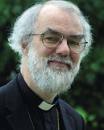Civil servants who are attempting to exclude faith from public life are simply ignorant of how Christianity has  shaped British history, the head of the Church of England has said.
shaped British history, the head of the Church of England has said.
Speaking on Tuesday in the House of Lords, the Archbishop of Canterbury Dr Rowan Williams said that a “plain lack of historical and cultural awareness” was behind the instinct of many civil servants to treat religion as a problem.
Dr Williams said that British tradition of democracy, tolerance and justice had been shaped by the influence of the teachings of Christianity and Judaism in particular.
However he said that some government bodies were unwilling to work with faith groups because of a “failure of understanding” about this.
He was speaking during a debate, tabled by the Chief Rabbi, Lord Sacks, on the role of faith in Britain ahead of the Diamond Jubilee.
Lord Sacks said that the Queen’s influence had ensured that relations between different religions in Britain were among the best in the world.
The Queen, he said, had “guided and sustained this nation through one of its most challenging transitions, into a multi-ethnic, multi-cultural and multi-faith society”.
Dr Williams has said before that religious groups in Britain were treated as an “exotic tolerated minority” and criticised attempts to ban Nativity plays or carol-singing out of misplaced sensitivity to other faiths.
He told the Lords: “Usually through no fault of their own, a generation of administrators and local officials has grown up with little or no sense of how our political and legal history in this country has become what it is as a direct result of a long conversation with the Jewish and Christian intellectual world, with the ethics and the theology of the human responsibility characteristic of that world.”
Such ignorance, he said, had led to a “dangerous assumption” that there is no need to speak up for Britain’s current “political and legal settlement”.
“But if we are to sustain our legacy of dignity before the law, participative government, and hospitality towards minorities, we had better be aware of just how and why our ancestors developed such a political ethic and what depth of thought and imagination is needed to keep it alive.
“This failure of understanding is, of course, one of the things that lies behind the reluctance in recent years to develop effective partnership between statutory bodies and faith groups in the work of social regeneration.”
But he said there were positive signs for the future with government now working more closely with faith groups.
Lord Singh, director of the Network of Sikh Organisations, said: “We still seem to see our different religions as mutually exclusive, while in reality we share common values that are centred on responsible living.
“The challenge for us in this Jubilee year is to work with others in secular society to bring these values to the fore, and to change an obsession with the culture of “me and mine” to one of greater responsibility and active concern for others.”















